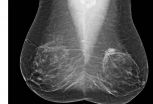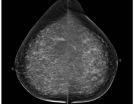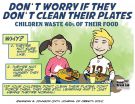(Press-News.org) CHICAGO - A study of breast cancers detected with screening mammography found that strong family history and dense breast tissue were commonly absent in women between the ages of 40 and 49 diagnosed with breast cancer. Results of the study were presented today at the annual meeting of the Radiological Society of North America (RSNA).
"Screening recommendations for this age group continue to be debated," said Bonnie N. Joe, M.D., Ph.D., associate professor in residence and chief of women's imaging at University of California, San Francisco (UCSF). "Recent publications have suggested risk-based screening based on family history and breast density. However, our study shows that this approach would miss a significant percentage of invasive cancers and could potentially be dangerous."
The retrospective study, conducted at UCSF, included 136 women between the ages of 40 and 49 with breast cancer identified by screening mammography between 1997 and 2012. Symptomatic patients undergoing diagnostic mammography and those with a personal history of breast cancer were excluded from the study. Patient family history, breast density, type of malignancy, lymph node status, and tumor receptor status were recorded.
"Notably, we found that almost 90 percent of the invasive cancers we would have missed using risk-based triage had positive receptor status, meaning they were very treatable and worth finding early," Dr. Joe said.
Of the 136 breast cancer cases identified, 50 percent were diagnosed as invasive, and 50 percent were diagnosed as ductal carcinoma in situ (DCIS), an early noninvasive form of breast cancer, although 88 percent of DCIS cases were intermediate or high grade.
A very strong family history was absent in 90 percent of patients, and extremely dense breast tissue was absent in 86 percent. Seventy-eight percent of patients had neither strong family history nor extremely dense breasts, including 79 percent of the cases of invasive disease.
"Our results show that by exclusively using a risk-based approach to screening mammography, we could potentially miss more than 75 percent of breast cancers in women in their 40s, thereby eliminating most of the survival benefit from screening mammography that has been previously shown in randomized controlled trials," Dr. Joe said.
Dr. Joe urges proponents of risk-based screening to continue research to find more effective means of risk-based triage.
"Neither family history nor breast density in combination or alone are sufficient risk factors to safely triage patients in risk-based screening," she explained.
Routine annual screening mammography has traditionally been recommended by organizations such as the American Cancer Society (ACS) and the American Medical Association (AMA) for all women beginning at age 40. In 2009, the United States Preventive Services Task Force (USPSTF) issued controversial new guidelines recommending screening with mammography every two years beginning at age 50.
"Based on our current knowledge and evidence shown in previous trials, it is still safest to get annual mammograms starting at age 40 in order to maximize the survival benefit of screening mammography," Dr. Joe said.
INFORMATION:
Co-authors on the study are Elissa R. Price, M.D., Alexander W. Keedy, M.D., Rita Gidwaney, M.D., and Edward A. Sickles, M.D.
Note: Copies of RSNA 2014 news releases and electronic images will be available online at RSNA.org/press14 beginning Monday, Dec. 1.
RSNA is an association of more than 54,000 radiologists, radiation oncologists, medical physicists and related scientists, promoting excellence in patient care and health care delivery through education, research and technologic innovation. The Society is based in Oak Brook, Ill. (RSNA.org)
For patient-friendly information on mammography, visit RadiologyInfo.org.
CHICAGO - Patients value direct, independent access to their medical exams, according to a new study presented at the annual meeting of the Radiological Society of North America (RSNA).
Fragmentation of health information among physicians, healthcare institutions or practices, and inefficient exchange of test results can decrease quality of care and contribute to high medical costs. Improving communications and giving patients more control over their care are critical goals of health IT initiatives.
"Easy and timely electronic access to an online unified source of ...
Disparities in mental-health treatment are known to be associated with patients' racial and ethnic backgrounds. Now, a large study by researchers with UC Davis has found one possible reason for those disparities: Some racial and ethnic minorities are less likely to be assessed and referred for treatment by their medical providers.
The study of more than 9,000 diverse individuals, including Latinos, African-Americans, Asian-Americans and non-Hispanic whites, found that patients of different racial and ethnic backgrounds reported experiencing differing treatment approaches ...
ANN ARBOR, Mich. -- Patients with head and neck cancer who used antacid medicines to control acid reflux had better overall survival, according to a new study from the University of Michigan Comprehensive Cancer Center.
Reflux can be a common side effect of chemotherapy or radiation treatment for head and neck cancer. Doctors at the University of Michigan frequently prescribe two types of antacids - proton pump inhibitors or histamine 2 blockers - to help treat this side effect.
The researchers looked at 596 patients who were treated for head and neck cancer. More than ...
Sons whose fathers have criminal records tend to have lower cognitive abilities than sons whose fathers have no criminal history, data from over 1 million Swedish men show. The research, conducted by scientists in Sweden and Finland, indicates that the link is not directly caused by fathers' behavior but is instead explained by genetic factors that are shared by father and son.
The study is published in Psychological Science, a journal of the Association for Psychological Science.
"The findings are important because cognitive ability is among the most important psychological ...
EVANSTON, Ill. --- Birth weight makes a difference to a child's future academic performance, according to new Northwestern University research that found heavier newborns do better in elementary and middle school than infants with lower birth weights.
Led by a multidisciplinary team of Northwestern researchers, the study raises an intriguing question: Does a fetus benefit from a longer stay in the mother's womb?
"A child who is born healthy doesn't necessarily have a fully formed brain," said David Figlio, one of the study's authors and director of Northwestern's Institute ...
Gorlin syndrome causes an increased risk of developing cancers of the skin and, rarely, in the brain. Around 1 in 30,000 people has the condition.
Most people with Gorlin syndrome have a change in a gene called PTCH1, but the new research has revealed that changes in a gene called SUFU also cause Gorlin syndrome and it is children with a change in SUFU that are 20 times more likely to develop a brain tumour.
Dr Miriam Smith, a lecturer in cancer genomics from the University's Institute of Human Development led the research, which was also carried out with The Christie ...
Whereas most adults are members of the Clean Plate Club, they eat an average of about 90% of the food they serve themselves, this is not true for children.
New Cornell research aggregated six different studies of 326 elementary school-aged children. It showed that, if their parents are not around, the average child only eats about 60% of what they serve themselves. More than a third goes right in the trash.
Unlike adults, kids are still learning about what foods they like and how much it will take to fill them up. "It's natural, for them to make some ...
Vitamin D supplements can reduce COPD lung disease flare-ups by over 40% in patients with a vitamin D deficiency - according to new research from Queen Mary University of London. COPD (chronic obstructive pulmonary disease) includes conditions such as chronic bronchitis and emphysema, and is thought to affect more than 3 million people in the UK.
The NIHR-funded randomised trial, published in the journal Lancet Respiratory Medicine, included 240 patients with COPD in and around London. Half of the patients (122) received vitamin D supplements (6 x 2-monthly oral doses ...
Muslim communities may not be as victimised by violent crime, or as dissatisfied with the police as is widely suggested and believed, according to new research by a Cambridge academic.
An examination of statistics taken from the Crime Survey of England and Wales between 2006 and 2010 reveals a surprising counter-narrative to commonly-held perceptions of British Muslim communities and their relationships to crime victimization and the criminal justice system.
Analysis of crime data generated by nearly 5,000 Muslims reveals few differences between Muslims and non-Muslims ...
People diagnosed with diabetes in midlife are more likely to experience significant memory and cognitive problems during the next 20 years than those with healthy blood sugar levels, new Johns Hopkins Bloomberg School of Public Health research suggests.
The researchers found that diabetes appears to age the mind roughly five years faster beyond the normal effects of aging. For example, on average, a 60-year-old with diabetes experiences cognitive decline on par with a healthy 65-year-old aging normally. Decline in memory, word recall and executive function is strongly ...



